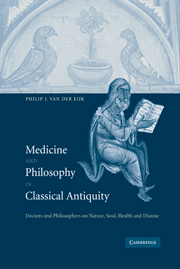 Medicine and Philosophy in Classical Antiquity
Medicine and Philosophy in Classical Antiquity Book contents
- Frontmatter
- Contents
- Acknowledgements
- Note on translations
- Note on abbreviations
- Introduction
- I HIPPOCRATIC CORPUS AND DIOCLES OF CARYSTUS
- II ARISTOTLE AND HIS SCHOOL
- 5 Aristotle on melancholy
- 6 Theoretical and empirical elements in Aristotle's treatment of sleep, dreams and divination in sleep
- 7 The matter of mind: Aristotle on the biology of ‘psychic’ processes and the bodily aspects of thinking
- 8 Divine movement and human nature in Eudemian Ethics 8.2
- 9 On Sterility (‘Hist. an. 10’), a medical work by Aristotle?
- III LATE ANTIQUITY
- Bibliography
- Index of passages cited
- General index
8 - Divine movement and human nature in Eudemian Ethics 8.2
Published online by Cambridge University Press: 22 September 2009
- Frontmatter
- Contents
- Acknowledgements
- Note on translations
- Note on abbreviations
- Introduction
- I HIPPOCRATIC CORPUS AND DIOCLES OF CARYSTUS
- II ARISTOTLE AND HIS SCHOOL
- 5 Aristotle on melancholy
- 6 Theoretical and empirical elements in Aristotle's treatment of sleep, dreams and divination in sleep
- 7 The matter of mind: Aristotle on the biology of ‘psychic’ processes and the bodily aspects of thinking
- 8 Divine movement and human nature in Eudemian Ethics 8.2
- 9 On Sterility (‘Hist. an. 10’), a medical work by Aristotle?
- III LATE ANTIQUITY
- Bibliography
- Index of passages cited
- General index
Summary
In Eudemian Ethics (Eth. Eud.) 8.2 Aristotle is searching for an explanation of eutuchia (εὐτυχία), which might be defined as ‘good fortune’ – sheer luck in matters in which the lucky man does not have any rational or technical competence, befalling the same man so frequently that it cannot be a matter of coincidence. Textual problems, extreme brevity and looseness of expression as well as the enormous span of the argument make it difficult to follow Aristotle's reasoning in detail. Yet there seems to be a consensus among modern interpreters concerning the conclusion of the chapter. The principal question was whether eutuchia is caused by nature or not (1247 a 2), and Aristotle's answer to this question, briefly summarised in 1248 b 3–7, is as follows. There are two forms of eutuchia, the first of which is both ‘divine’ (theia) and ‘by nature’ (phusei), and the second of which is caused by ‘chance’ (tuchē); both forms are ‘irrational’ (alogoi), but the first form is ‘continuous’ (sunechēs), whereas the latter is not. The first form is the one which Aristotle has been trying to explain from the beginning; the existence of the second form he was compelled to recognise in the course of his argument.
It appears that this first form of eutuchia is based on a kind of interaction between a principal divine movement (1248 a 25ff.) and a human natural constitution (1248 a 30–1; 39–41).
- Type
- Chapter
- Information
- Medicine and Philosophy in Classical AntiquityDoctors and Philosophers on Nature, Soul, Health and Disease, pp. 238 - 258Publisher: Cambridge University PressPrint publication year: 2005
- 2
- Cited by


